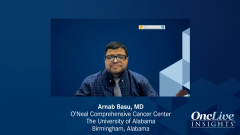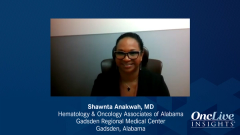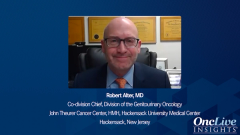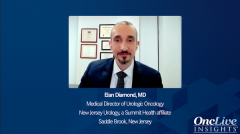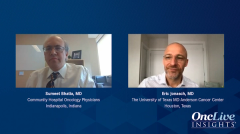
Role of Community and Academic Centers in the Treatment of Patients with Advanced RCC
Dr Sumeet Bhatia highlights the challenges faced by community oncologists who treat patients with advanced renal cell carcinoma and which patients they refer to academic centers.
Episodes in this series

Eric Jonasch, MD: Let’s move on to a couple of final questions. What percentage of patients do you refer to an academic center with renal cell carcinoma, and why would you do that? Because obviously, you have a tremendous proficiency of this already, so why would you refer these patients?
Sumeet Bhatia, MD: Because you’re still not curing these patients. If we have a first-line patient for whom there is a clinical trial available, that would still be our choice. In our center, we have opened up clinical trials for that purpose right from the beginning, but that is thanks to your help. As a matter of fact, the bigger question is that once we treat people with an agent like pembrolizumab with axitinib, or upfront IO [immuno-oncology] plus TKI [tyrosine kinase inhibitor], when they progress, what should we do? I think the standard of practice should be a clinical trial because I do not know of any good data that tell us how we treat those people in that situation.
Eric Jonasch, MD: It’s funny, I was going to actually ask you that. What do you do for people who progress on first-line therapy? Nowadays most of your patients are probably going to be on an IO/TKI or an IO/IO.
Sumeet Bhatia, MD: I ask for help. Essentially, for most of these patients, we try to find them a clinical trial if they’re able to travel. Otherwise, I have treated these patients with tivozanib because it has come up with an FDA approval in that situation. But other than that, that’s not a really good population to treat with. I have been in the past tempted to treat them with nivo [nivolumab]-ipilimumab, but again, as we talked about earlier, the last data from ASCO [American Society of Clinical Oncology annual meeting] have told me that’s probably not the best way to take care of these patients.
Eric Jonasch, MD: With regard to clinical trials, if you do refer patients to me, we do have clinical trials. The big new direction in renal cell carcinoma is looking at HIF [hypoxia-inducible factor]-2 alpha inhibitors. There have been some interesting data with belzutifan. I’ve been very involved in the development of that compound, and we got it approved for Von Hippel-Lindau disease last year. Hopefully, we will see some positive data in the randomized subsequent line therapy trial of belzutifan vs everolimus. There are some combination studies with belzutifan that are in an early phase, and we also have other triplet types of regimens, ipi-nivo-cabo [ipilimumab-nivolumab-cabozantinib] and things like that. There are definitely some things out there. Once again, I think there’s been a plateau with IO/TKI and IO/IO, but now we’re going to move forward with some other things that are going to be pretty exciting.
Sumeet Bhatia, MD: In the last 5 years, have you treated anybody with sirolimus?
Eric Jonasch, MD: No, I have not.
Sumeet Bhatia, MD: Me either, I was just trying to remember. You get tempted when you do not have any other options, but that’s one of the reasons we hope patients have clinical trials. Now belzutifan, I was actually able to get free for a patient who had progressed, and at this time, I do not know what the response is, so maybe at a later time I can report back to you. It was an off-label use.
Eric Jonasch, MD: Fingers crossed.
Sumeet Bhatia, MD: I don’t know what that’s going to do, but clearly, that’s where, again, we’ll end up getting next-generation sequencing in this situation, and hope that we can get them on a clinical trial, either MATCH, TAPER, or one of the basket trials, and of course refer them out.
Eric Jonasch, MD: Right.
Sumeet Bhatia, MD: It reminds me of when I started my practice, I used to do high-dose interleukin-2 [IL-2], and people have come back and asked me, do you want to treat these people with high dose interleukin-2? And to this day, I cannot get myself to go back to it.
Eric Jonasch, MD: It’s interesting in some ways, I think philosophically, ipilimumab-nivolumab has replaced high-dose IL-2. I don’t know what you want to call it, the swing for the fences option, where there might be some toxicity, but there is a chance for a CR [complete response]. Yes, I agree, I used to, when I started my career back at [Massachusetts General Hospital] 20 years ago, I set up high-dose IL-2 there, having been trained by Mike Atkins, [MD]. But since I’ve moved to [the University of Texas] MD Anderson [Cancer Center], it’s really tapered off, especially in the last 5 years
Sumeet Bhatia, MD: I still get referrals for people asking for that, and my take on it is, I can do it, but I shouldn’t.
Transcript edited for clarity.


